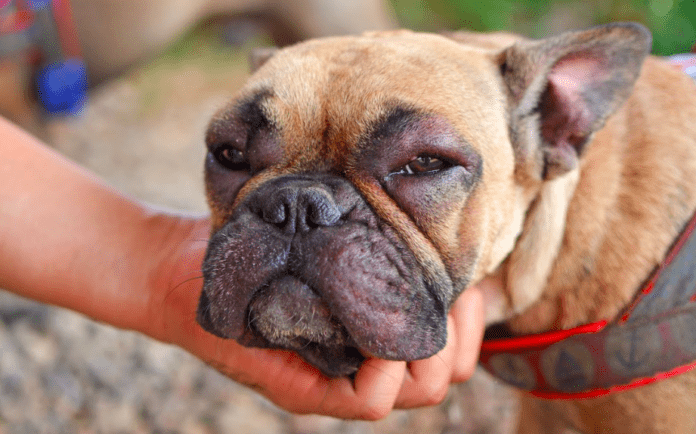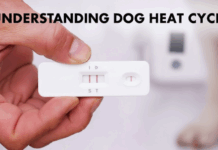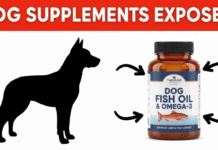Last Updated on March 2, 2022 by Dogs Vets
How To Take Care Of Dogs With Sensitive Skin And Allergies
Scratching, itching, and chewing are signs of skin conditions in dogs that are mainly caused by allergies. Luckily, there are various ways to help dogs with skin problems and allergies.
In some cases, there are some things you can do at home to prevent mild itching from becoming a secondary infection.
However, some cases require a vet’s intervention before the matter escalates. It’s essential to manage your dog’s allergies, failure of which can lead to health issues such as hair loss or skin infections.
The following are ways to help a dog with sensitive skin and allergies.
Understanding Dog Allergies
Allergens are harmless substances that trigger an immune response in dogs with allergies. This leads to sneezing, itchy eyes, or skin problems.
The primary source of dog allergen is a protein in its saliva. However, dander is also believed to contain an allergen as well.
Nevertheless, while all dogs might experience allergies, the affected level varies depending on how much hair and skin different breeds shed. Dog allergies and other pet allergies are primary triggers for allergic rhinitis and asthma.
Symptoms Of Dog Allergies
Allergies’ symptoms may vary depending on the cause. For example, a dog that experiences anaphylactic shock will have a drop in blood pressure first. This is different from a dog that has a skin condition.
Generally, symptoms of allergies reaction might include:
- Hives
- Itchiness
- Diarrhea
- Swelling of the eyelids, ears, face, or earflaps
- Sneezing
- Itchy ears
- Constant licking
- Chronic ear infection
- Running or itchy eyes
While these signs could indicate an allergic reaction, they can also signify other medical conditions. If your dog experiences some of these symptoms, ensure to visit a vet for accurate diagnosis and suitable treatment for your dog.

How To Help A Dog With Allergies And Sensitive Skin
If your dog has an allergic reaction or sensitive skin, there are things that you can do to help relieve the symptoms. Among the things you can do include:
-
Bathe Your Dog Regularly
Bathe your dog at least twice with a gentle shampoo specially made for dogs. Your dog can benefit from shampoo ingredients such as aloe and oatmeal.
Also, your vet might prescribe medicated dog shampoo for sensitive skin. While bathing your dog, remember to clean your pet’s ears to prevent secondary infections from occurring. If you suspect that your dog might be allergic to outdoor elements such as grass, wipe its feet before coming inside to minimize allergens on its skin.
-
Provide Your Dog With The Right Food
Like in humans, food quality can affect your dog’s general health. It’s therefore essential to ensure that you feed your dog with only the best.
If your vet suspects a food allergy in your dog, they might recommend a diet change to improve the symptoms. This recommendation might involve changing to a specific limited ingredient diet with novel protein such as duck and fish since beef and chicken are typical diets that cause allergies to dogs. It’s therefore essential to avoid feeding your dog with toxic food to prevent allergies.
-
Work With A Vet
At first sight of itching, it’s essential to make an appointment with a reputable vet. If the itching persists, skin appears red, scaly, irritated, or hair loss occurs, visit your vet as soon as possible. In such events, your vet might prescribe an over-the-counter medication before performing an exam.
If your vet thinks that your dog’s allergy is due to its skin problem, they might offer you various options. If the dog is suffering from mild to moderate skin problems, the vet might prescribe anti-itching medication to improve symptoms. However, if fleas cause your dog’s skin problem, the treatment might be as simple as flea prevention.
It’s crucial to adhere to your vet’s recommendations for your dog to recover. Ensure to finish all courses of medication and follow instructions regarding the treatment.
You should also follow up with the vet until your dog has fully recovered.
-
Pick The Right Bed For Your Dog
When choosing a bed for your dog, consider a foam dog bed as it’s less likely to shelter allergens like dust mites. It’s also recommended to change dog beds annually, regardless of fabric. In the event of environmental allergies, ensure to wash dog bed covers weekly using dye and fragrance-free detergent.
-
Prevent Fleas
Flea prevention is paramount, more so in dogs with allergies. If your pet is allergic to fleas, it can react to a few bites. If you aren’t keen on your dog’s physical health, you might not realize it has fleas since dogs intend to chew fleas off them. As the flea population increases, the reaction gets worse. This will only increase the response to flea bites, deteriorating your dog’s health.
Whether your dog has fleas or not, it requires effective flea prevention throughout the year. Most flea prevention products come in pill, flea collar, or topical applications.
-
Take Your Dog For Allergy Testing
If your dog’s sensitive skin and allergies aren’t responding to treatment, you might consider taking it for allergy testing. Your vet will refer you to a reputable veterinary dermatologist in severe cases. The dermatologist will perform skin testing for a better diagnosis.
Once the problem is determined, your vet will prescribe suitable treatment for your dog.
Conclusion
Do you think that your dog could be experiencing an allergic reaction? If yes, it’s essential to investigate more about what your dog is allergic to.
Allergies in dogs can result from different factors such as food ingredients, vaccine reactions, fleas, and others.
Unfortunately, if you leave dog allergies untreated, they might cause skin problems such as itchiness teary eyes, among others.
While there are things you can do at home to decrease allergies and skin sensitivity, such as bathing the dog regularly, changing the diet, and preventing fleas, in some cases, you need to make an appointment with your vet.
They will perform some tests on your dog to identify allergens and prescribe the best treatment plan. Therefore, if your dog isn’t responding to home remedies for allergies and sensitive skin, it might be time to take him to a veterinarian.
Facts Check:
We hope you enjoyed this article… What are your thoughts on How To Take Care Of Dogs With Sensitive Skin And Allergies?
Рleаse let us knоw yоur thоughts in the соmments seсtiоn. Feel free to share with us in the comments section below.























